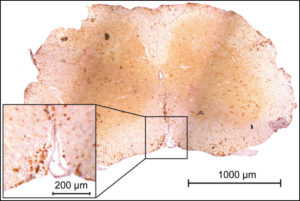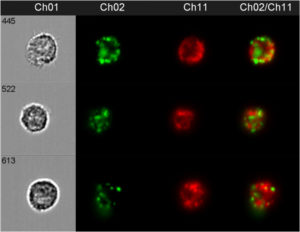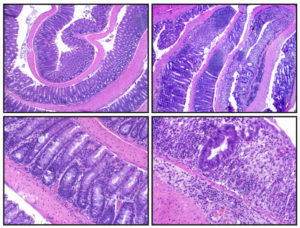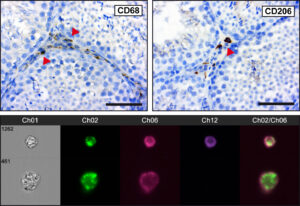Multiple Sclerosis (MS) is a chronic inflammatory disease of the CNS, which is characterized by massive T cell and macrophage infiltration leading to demyelination, axonal damage and neurological symptoms such as paralysis. Experimental autoimmune encephalomyelitis (EAE) is an animal model that mimicks many aspects of the pathogenesis of MS and thus can be used to study disease mechanisms and new treatment approaches in preclinical models. In cooperation with colleagues from the clinic, we also study blood samples collected from MS patients. Our research aims to better understand the role of glucocorticoids in the pathogenesis of MS and to develop improved therapeutic strategies by targeted drug delivery using nanoparticles.

Allergic asthma is a highly prevalent disease which affects more than 300 million people wordwide. It is characterized by a massive infiltration of the lung with eosinophil granulocytes leading to chronic inflammation and fibrosis of the airways. In contrast, neutrophil granulocytes are the dominant cell type in acute lung injury (ALI), an acute inflammatory disease of the lung that develops as a consequence of a variety of insults. While glucocorticoids are rountinely administered in the treatment of allergic asthma, their application in the treatment of ALI remains controversial, although dexamethasone is the only approved treatment for the cytokine release syndrome in Covid-19 patients. The aim of our work is to identify the mechanistic basis of glucocorticoids and vitamin D, in particular their cell type specific activities, and to develop new concepts to treat inflammatory lung diseases, especially by using nanoparticles.

Intestinal bowel disease (IBD) is a group of chronic inflammatory disorders of the gastrointestinal tract, which are characterized by a disturbed balance of the mucosoal immune system leading to symptoms such as bloody diarrhea and abdominal pain. Intestinal inflammation is also considered to be a major risk factor of colorectal cancer (CRC). Glucocorticoids are a mainstay in the treatment of IBD although not all patients respond to this treatment equally well. The research team of Dr. Sybille Reichardt thus aims to identify the activity of glucocorticoids in different cell types such as macrophages and intestinal epithelial cells during IBD, their molecular mode of action, and the impact of glucocorticoids on inflammation-associated tumorigenesis using preclinical models of colitis and CRC.

Testicular germ cell cancer (TGCC) is the most common malignancy in young men. It can be subdivided into seminomas, that are characterized by a pronounced infiltration of immune cells, and the more heterogenous group of non-seminomas, both of which differ in treatment strategy and prognosis. However, the role of individual immune cell subtypes in the healthy testis as well as in TGCC patients remains poorly understood. In cooperation with the Clinic of Urology we employ genetically modified mice, coculture models of tumor cell lines with primary human T cells and monocytes, as well as various patient specimens to gain new insights into pathophysiology of TGCC. Hereby we aim to better understand the role of immune cells in this particular cancer entity and to unveil new approaches to improve diagnosis and therapy.

